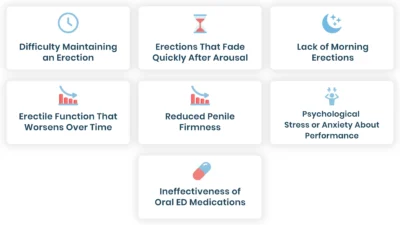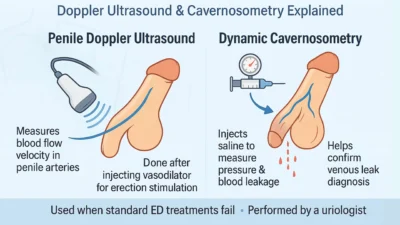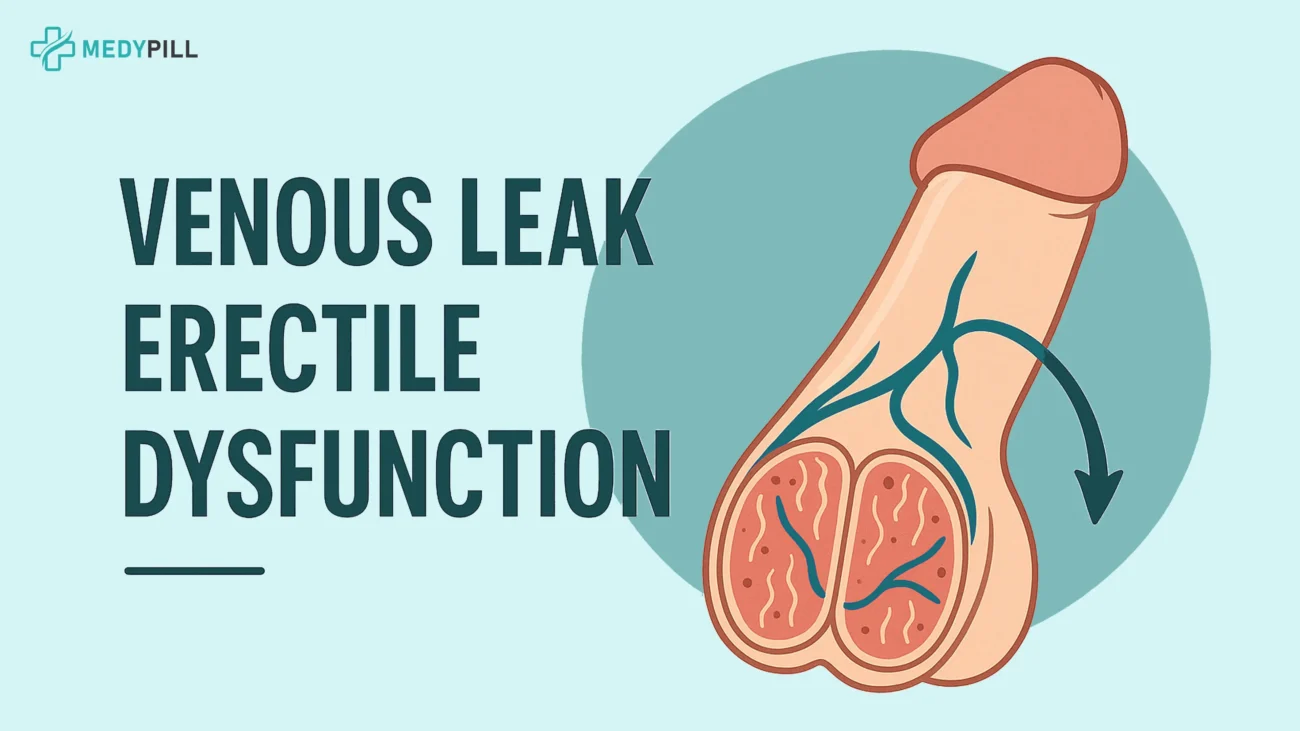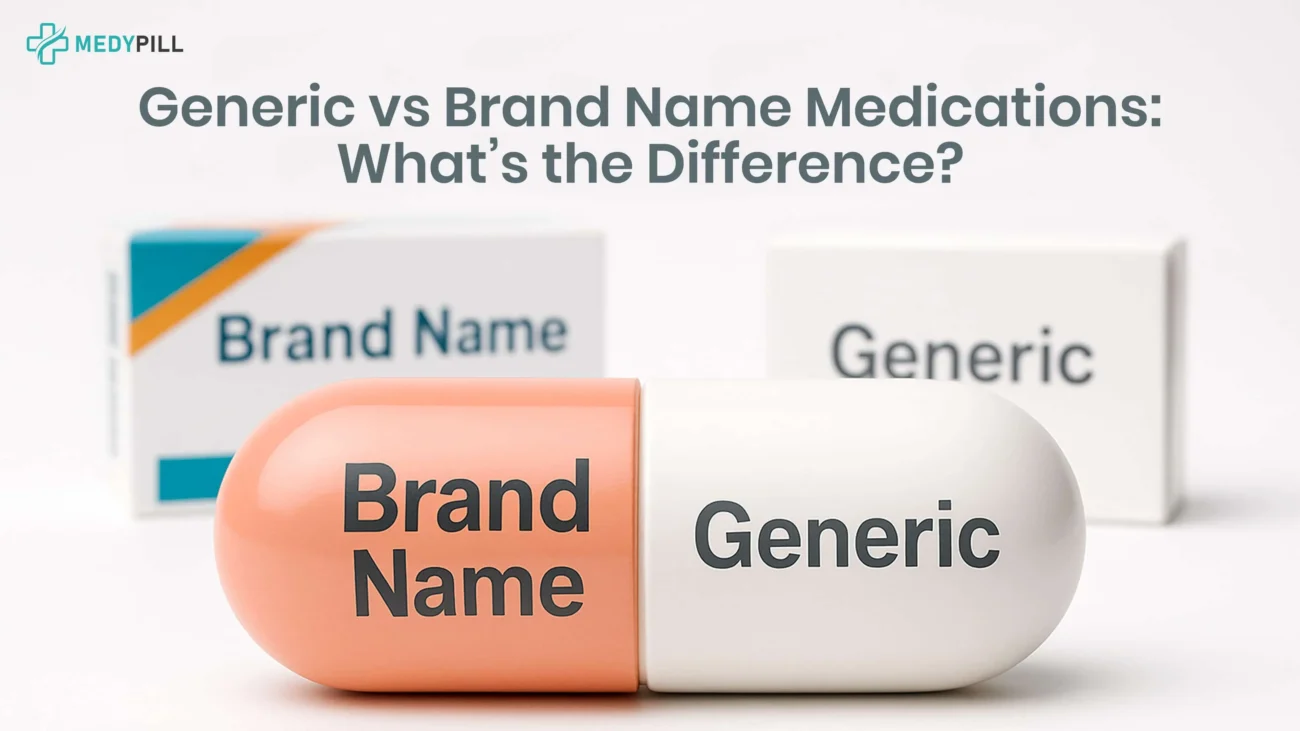Venous leak erectile dysfunction (ED) occurs when blood enters the penis normally but leaks out too quickly through the veins, making it hard to maintain an erection.
Even if a man can become aroused and initially get an erection, this condition causes the erection to fade rapidly, often before or during sexual activity.
This guide explains what venous leak ED is, how to recognize it, why it happens, and the most effective ways to manage and treat it.
What Is Venous Leak Erectile Dysfunction (ED)?
Venous leak ED, also known as venogenic ED or penile venous insufficiency, is a condition where the veins in the penis fail to trap blood inside the erectile tissue (corpora cavernosa) during arousal.
While the arteries deliver enough blood to initiate an erection, the veins don’t close off properly, causing blood to escape prematurely.
This results in erections that are weak, short-lived, or disappear during intercourse. It’s particularly common in younger men or those who don’t respond well to standard oral ED medications.
Top 7 Symptoms of Venous Leak ED (You Shouldn’t Ignore)

Venous leak ED typically shows clear signs early on, often characterized by difficulty maintaining firm erections.
Spotting these can lead to faster diagnosis and care.
1. Difficulty Maintaining an Erection
Men with venous leak ED can usually get an erection but struggle to keep it firm during intercourse.
This happens because blood escapes too quickly through the veins, leading to incomplete erections that fail to satisfy sexually.
2. Erections That Fade Quickly After Arousal
Even when sexually excited, men may notice that their erection disappears shortly after it begins.
This early loss of rigidity is a hallmark of venous leakage, where the veins can’t retain the blood needed to sustain the erection.
3. Lack of Morning Erections
A healthy man typically wakes with spontaneous erections, which reflect good blood flow and nerve function.
If these morning erections are weak or absent, it may indicate venous insufficiency affecting blood retention.
4. Erectile Function That Worsens Over Time
Venous leak ED often starts subtly and gets worse.
Initially, erections may feel slightly weaker, but over time, they become too soft or short-lived for satisfactory sex. This progression is a key indicator.
5. Reduced Penile Firmness
Men may notice partial erections or that the firmness changes with body position.
Some report firmer erections when lying down but a loss of rigidity when standing, suggesting a leak worsened by gravity.
6. Psychological Stress or Anxiety About Performance
Repeated failures to maintain erections can lead to intense self-doubt, performance anxiety, and fear of sexual activity.
This psychological toll may further reduce arousal and erection quality.
7. Ineffectiveness of Oral ED Medications
Many with venous leak ED find that common pills like Viagra or Cialis don’t help.
These drugs increase blood flow but rely on the veins trapping that blood, which is the exact mechanism impaired in venous leak.
Causes of Venous Leak ED: Why It Happens
Venous leak ED typically stems from structural or functional issues in the penile tissues that interfere with blood retention during arousal.
One of the most common causes is damage to the tunica albuginea, a fibrous sheath that helps trap blood inside the penis during an erection.
When this layer becomes weak or less elastic, it fails to compress the veins properly, resulting in early blood drainage.
Connective tissue disorders also play a significant role.
When collagen or elastin fibers in the penile structure are abnormal, the veins may become too lax to hold blood effectively, compromising erection stability.
Injuries or trauma, including complications from surgery, can damage blood vessels and trigger venous leakage.
Chronic health conditions such as diabetes, Peyronie’s disease, and vascular disease further contribute by impairing blood vessel integrity and elasticity.
Hormonal factors, particularly low testosterone, can weaken erection-supporting mechanisms, while neurological disorders may disrupt nerve signals to the pelvic muscles and blood vessels that regulate blood retention.
Additional contributors include:
- Medications: Some drugs may interfere with nerve or vascular function.
- Psychological conditions: Severe stress, anxiety, or depression can intensify symptoms or mimic the effects of venous leak ED.
For accurate diagnosis and effective treatment, it’s important to consider these factors collectively.
How Doctors Diagnose Venous Leak ED (Doppler Ultrasound & Cavernosometry Explained)

To confirm a diagnosis, urologists use advanced imaging and blood flow tests:
Penile Color Doppler Ultrasound
This non-invasive test evaluates blood flow into and out of the penis.
After a prostaglandin injection (to induce an erection), persistent high blood outflow signals a venous leak.
This test has a diagnostic accuracy of over 95%.
Dynamic Cavernosometry and Cavernosography
For severe cases or before surgery, doctors use contrast dye and imaging to locate leak sites.
Cavernosometry measures internal penile pressure, while cavernosography visually maps the leaking veins.
Comprehensive Evaluation
Doctors also review the patient’s sexual history, conduct physical exams, hormone tests, and assess psychological factors using questionnaires like the IIEF-6.
Treatment Options for Venous Leak ED
Managing venous leak ED requires a combination of lifestyle changes, medications, devices, and sometimes surgery.
The first step in treatment is improving overall health by managing chronic conditions like high blood sugar, cholesterol, and blood pressure.
Maintaining a healthy weight and quitting smoking are also key to protecting vascular health and enhancing erectile function.
Medications like PDE5 inhibitors (Viagra or Cialis) are often tried initially. These may help in mild cases but tend to be less effective when the core problem, blood leaking out of the penis, isn’t addressed.
Related: What Is Stronger: Sildenafil or Tadalafil?
Vacuum erection devices (VEDs) offer a practical, non-drug solution. These devices create suction that draws blood into the penis, and a constriction ring placed at the base helps retain it.
For many men, this method can restore sufficient firmness for intercourse.
Minimally invasive procedures are becoming increasingly popular.
Venous embolization involves using a catheter to seal off the leaking veins with a special agent and has shown success rates above 95% in properly selected patients.
Ablation techniques, such as heat or chemical-based destruction of defective veins, can also be helpful.
These procedures have reported short-term success in roughly 80% of cases.
For more persistent or anatomically specific cases, these surgical options may be considered:
- Venous ligation surgery involves tying off problematic veins. Although invasive, it can be effective in certain anatomical scenarios.
- Penile implants: Used in severe and treatment-resistant cases, this surgical approach replaces erection function with a device that allows manual control.
Choosing the right treatment depends on the severity of the leak, the individual’s overall health, and how they’ve responded to previous options.
Personalized care guided by a specialist leads to the best results.
Natural Remedies & Lifestyle Changes to Improve ED

While not a cure, healthy lifestyle choices can significantly support erectile health:
Regular Exercise & Weight Loss: Improves blood circulation and testosterone levels.
Heart-Healthy Diet: A Mediterranean-style diet rich in vegetables, fruits, healthy fats, and whole grains supports vascular health.
Quit Smoking & Limit Alcohol: Both restrict blood flow and lower sexual performance.
Pelvic Floor Exercises: Strengthen muscles involved in maintaining erections.
Herbal Remedies: Supplements like Ashwagandha or Ginseng may offer mild benefits, but evidence is limited. Always consult a healthcare provider before use.
Stress Reduction & Sleep: Mindfulness, therapy, and proper rest help balance hormones and mental well-being.
Coping with Venous Leak ED: Mental Health & Relationship Tips
Managing the emotional impact is just as crucial as physical treatment:
- Open Communication: Honest conversations with partners help reduce shame and increase support.
- Therapy: Individual or couples counseling can address performance anxiety, depression, or relationship strain.
- Cognitive Behavioral Therapy (CBT) has proven benefits for regaining sexual confidence.
- Reframe Intimacy: Exploring non-penetrative forms of closeness can reduce pressure and improve connection.
- Join Support Groups: Talking with others going through similar issues can reduce feelings of isolation.
Conclusion
Venous leak erectile dysfunction is a challenging but treatable condition that affects blood retention in the penis, leading to weak or short-lived erections.
Early symptoms include difficulty maintaining erections, loss of morning wood, and poor response to ED medications.
Diagnosis relies on Doppler ultrasound and advanced imaging, while treatment ranges from lifestyle changes and devices to minimally invasive embolization and surgery.
Emotional support and open communication are vital to overcoming both the physical and psychological effects of venous leak ED.
If you suspect this condition, consult a urologist or sexual health specialist for an accurate diagnosis and tailored treatment.
FAQs






